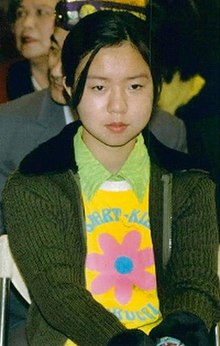Pai Hsiao-yen
| Pai Hsiao-yen | |
|---|---|
 |
|
| Born |
Pai Hsiao-yen 23 June 1980 |
| Died | 20 April 1997 (aged 16) Taipei County, Republic of China |
| Nationality |
|
| Citizenship |
|
| Education | Hsing Wu High School |
| Parent(s) |
|
Pai Hsiao-yen (traditional Chinese: 白曉燕; simplified Chinese: 白晓燕; pinyin: Bái Xiăoyàn; Wade–Giles: Pai Hsiao-yan; 23 June 1980 – 20 April 1997) was the only daughter of popular Taiwanese TV host and actress Pai Ping-ping and Japanese author Ikki Kajiwara.
Pai Hsiao-yen disappeared after leaving for her school, Hsing Wu High School, on the morning of April 14, 1997. Her family received a ransom request of US$5,000,000 (equivalent to about $7,460,000 in 2016) along with a severed piece of her little finger and a photograph of a bound girl.
Press in Taiwan first reported the incident on April 23, 1997, which contradicted the accepted practice of reporting the kidnapping after its resolution. Some of the pre-planned ransom drops were aborted when kidnappers spotted police and media tailing Pai Ping-ping. However, after the abductors negotiated with the police for 11 days and changed the locations of payment more than 20 times, the police finally decoded the communication methods used by the abductors. In the subsequent police raid, one suspect was arrested while two others escaped after an intense gun fight with the police.
Pai Hsiao-yen's mutilated body, weighted down with dumbbells, was found in a drainage ditch on April 28, 1997. Investigators said that she had been dead for ten days before her body's discovery. Ransom negotiations had continued after the likely time of Pai's death; an impersonator placed a telephone call to give Pai Ping-ping the impression that her daughter was alive. Tim Healy and Laurie Underwood of Asiaweek said that Pai was "apparently tortured" before her death. The photograph of her naked dead body was leaked to the mass media, including the China Times, which printed it.
Twelve accessories were arrested, but three of the main criminals, Chen Chin-hsing (陳進興; Chén Jìnxīng), Lin Chun-sheng (林春生; Lín Chūnshēng), and Kao Tien-min (高天民; Gāo Tiānmín) escaped. A fourth person, Chang Chih-hui (張志輝; Zhāng Zhìhuī, Chen's brother-in-law) was suspected of involvement, but his sentence was eventually overturned due to insufficient evidence. An island-wide manhunt began and the police were ordered to shoot the suspects without warning if they showed any sign of resistance.
...
Wikipedia
